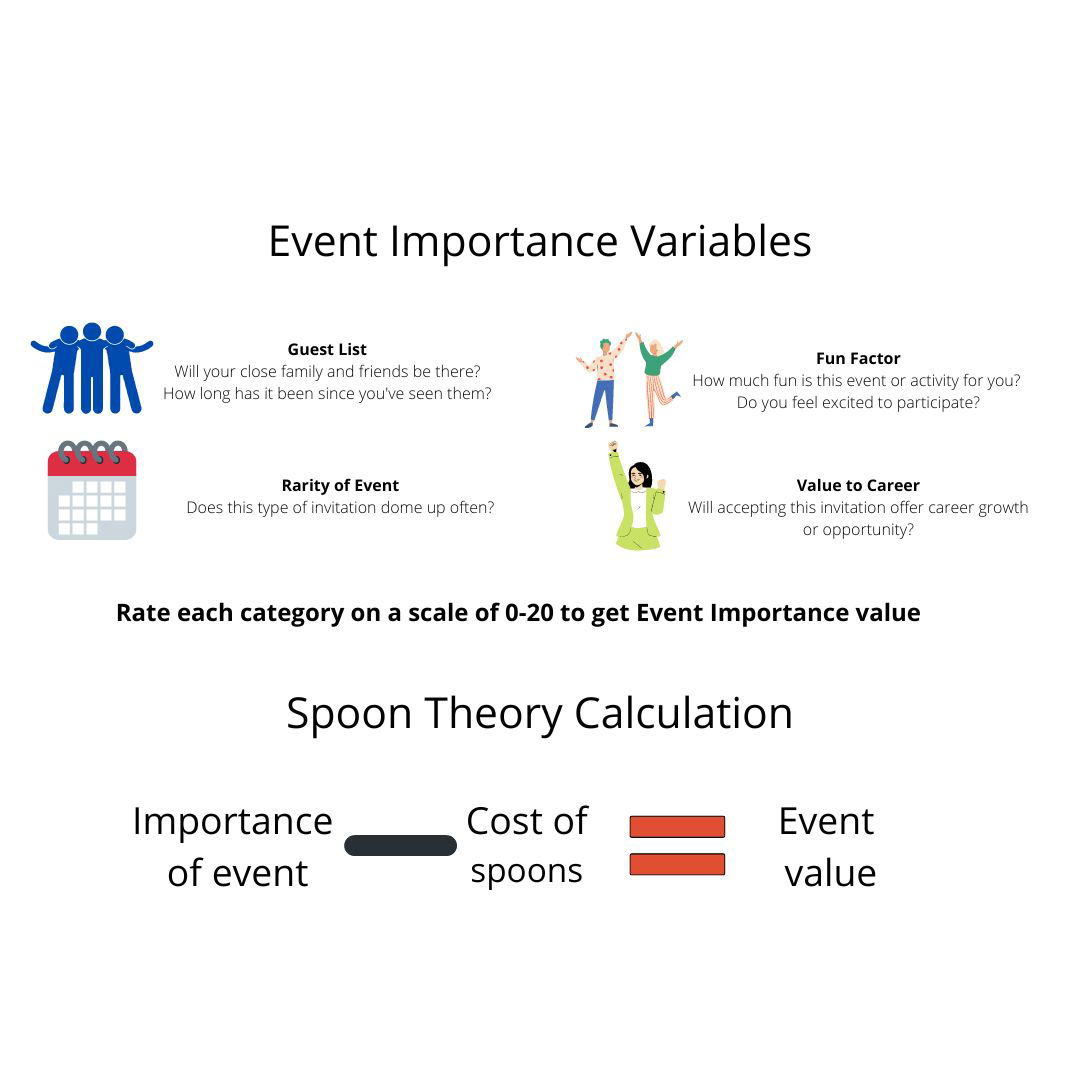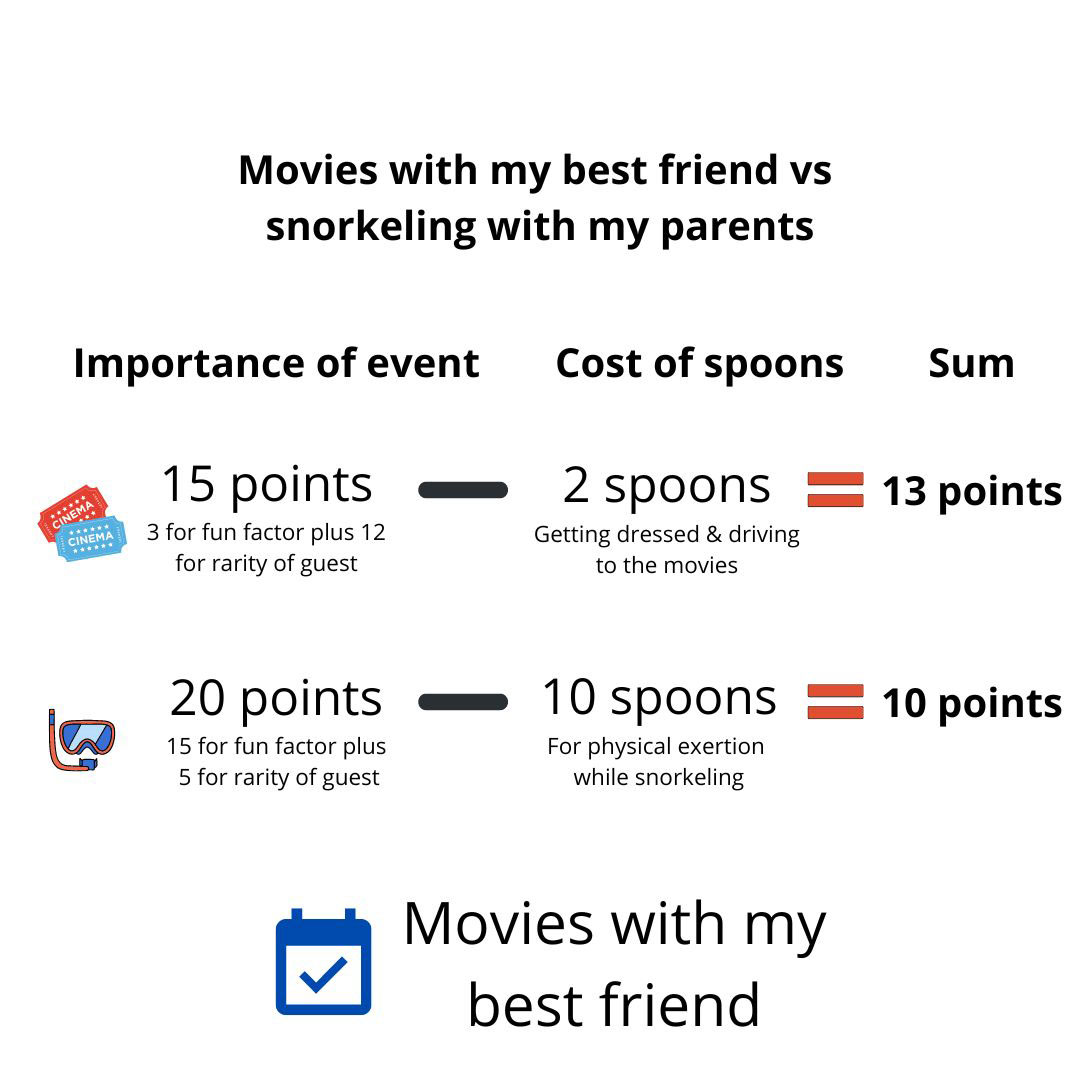Session Information
Date: Saturday, November 12, 2022
Title: Patient Perspectives Poster
Session Type: Poster Session A
Session Time: 1:00PM-3:00PM
Background/Purpose: Patients living with rheumatoid arthritis (RA) often also live with comorbid mental health conditions. Regardless of diagnosed mental health condition, living with a chronic disease can cause emotional strain due to the physical impacts of the disease itself. Beyond activities of daily living (ADLs), engagement in social activities often declines as patients struggle with energy expenditure and chronic pain. This can have a significant impact on wellbeing as the importance of social support for positive health outcomes is well documented. As a patient living with RA for 26 years, I formulated a simple cost-benefit analysis using principles from “the Spoon Theory” in order to enhance my social engagement and improve my mental health.
Intervention: The Spoon Theory is a theoretical framework developed by 1Christine Miserandino (2003), that describes a “spoon” as representing one unit of energy that individuals can use to complete daily tasks and activities. More than individuals who live without chronic health conditions, those with chronic disease possess a finite, reduced, number of spoons that must be strategically utilized in order to complete tasks such as personal care activities, working, or cleaning, in addition to social activities like attending a wedding, snorkeling with friends, or dancing. In RA, over-expenditure of one’s spoons leads to increased and often debilitating inflammation, fatigue, and joint pain until steps have been taken to recover back to baseline.
My proposed intervention, Spoon Theory Economics, therefore engages the Spoon Theory framework by incorporating it into a cost-benefit analysis of social events. As a patient, this helps me prioritize and enjoy social events largely free of over-expenditure of spoons. The analysis is based on a simple calculation of the difference between the importance of an event (rated on a scale of 0-20) and the amount of energy (spoons) required to do it (also rated on a scale of 0-20). The difference is calculated. In essence, the higher the total value, the greater the emotional gain. The variables I consider when determining the importance of events are as follows: Guest list, Rarity of event, Fun value, Value to career. See Figure 1 for an illustration of the Spoon Theory equation.
Maintenance: In addition to careful planning, Spoon Theory Economics has helped me make more meaningful decisions and empowered me to engage in more activities that enhance my social support. Despite benefits I’ve experienced while implementing this intervention, I recognize that some events require attendance for various reasons, even if the spoons don’t point that way. See Figure 2 for an example of how I use the Spoon Theory.
Quality of Life: This intervention works has improved my life in two ways. First, it has helped me scale back and prioritize events which have the greatest emotional pay-off. Second, it has lessened the emotional strain of living with RA by helping me to engage with my support system in more ways than ever before.
To cite this abstract in AMA style:
Aleite S. Engaging with the Spoon Theory: How I Make Decisions Using a Cost-Benefit Analysis That Works to Improve My Mental Health While Living with RA [abstract]. Arthritis Rheumatol. 2022; 74 (suppl 9). https://acrabstracts.org/abstract/engaging-with-the-spoon-theory-how-i-make-decisions-using-a-cost-benefit-analysis-that-works-to-improve-my-mental-health-while-living-with-ra/. Accessed .« Back to ACR Convergence 2022
ACR Meeting Abstracts - https://acrabstracts.org/abstract/engaging-with-the-spoon-theory-how-i-make-decisions-using-a-cost-benefit-analysis-that-works-to-improve-my-mental-health-while-living-with-ra/


